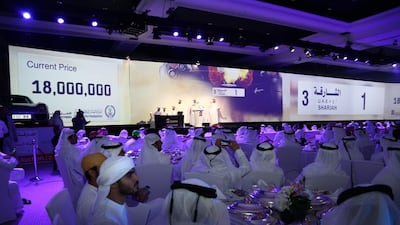A car registration plate bearing just the number one fetched $4.9 million at auction in Sharjah.
Emirati Arif Al Zarouni was the winning bidder the on plate number. His bid was 18 times the reserve price but is not the highest sum that has been paid for a collector’s registration plate in the UAE.
In 2008, $14.2m was paid at auction for the number one plate of the Abu Dhabi emirate.
Sixty sought-after plates were up for sale at Saturday’s auction, held by Emirates Auction in collaboration with Sharjah Police Headquarters.
The most popular numbers were 12, 22, 50, 100, 333, 777, 1000, 2016, 2020 and 99999.
Number 12 was sold at Dh2.07m, while 22 fetched Dh2.08m. The auction made a total of $13.6m.
The number of registered bidders was 1,340, which is a record in the UAE.
business@thenational.ae
Follow The National's Business section on Twitter

